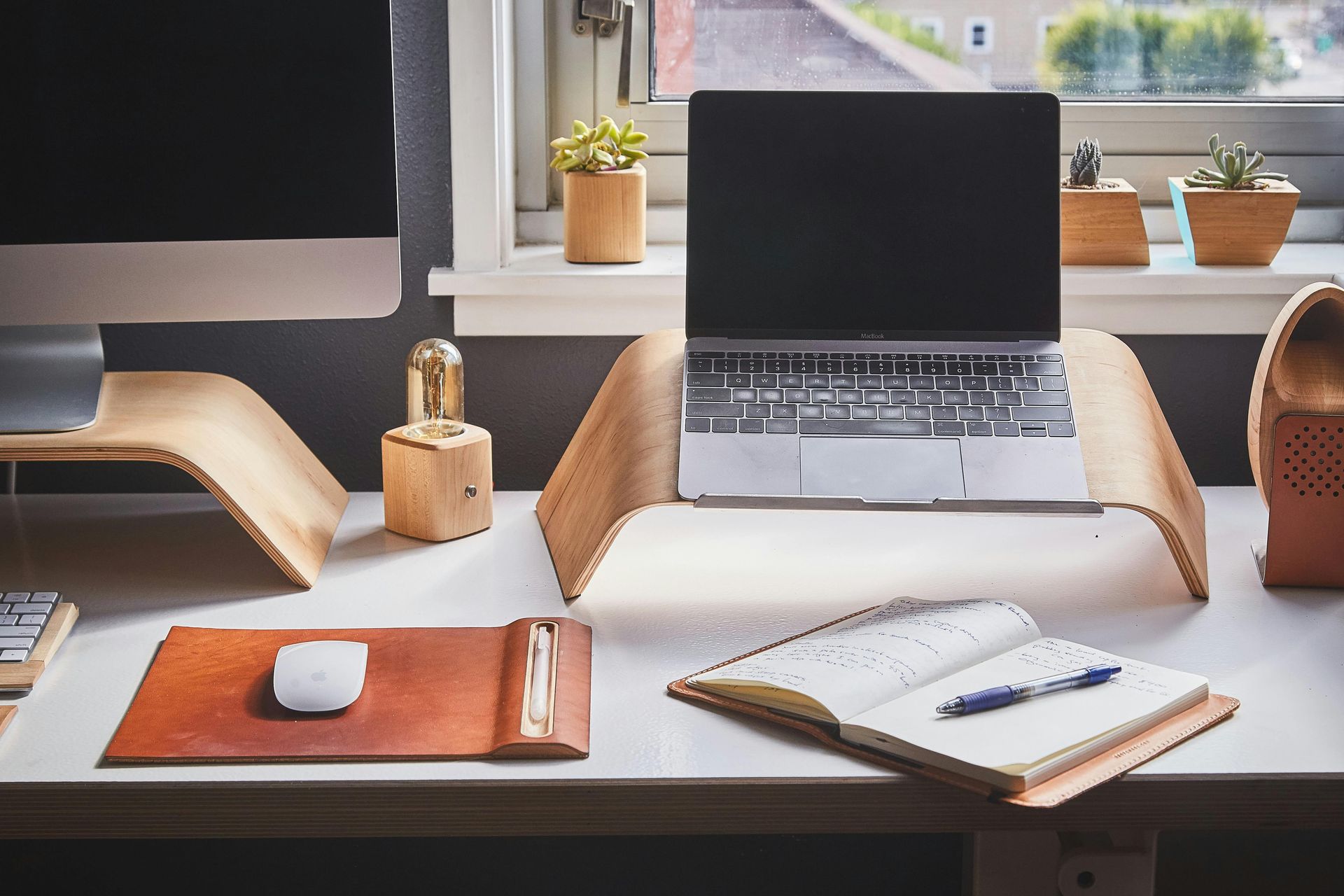What is a Home Office and why do you need one?
Every Sole Trader has to carry out business administration somewhere
A Home Office comes in many a different shape and size - from a dedicated or shared room; to an alcove under the stairs or a den in the attic; to a garage or shed in the garden; to the cab of a van or the corner of a kitchen table. Some are in use all through the day, some are used intermittently as required, and other spaces - where calls, invoicing, writing quotes and other administration takes place on the fly - are not often considered to be a workspace when they actually are.
What is a Home Office?
Anyone who runs a business for themselves has to carry out administration, use a computer, deal with paperwork, make calls and store information in both hard and soft copy formats. This is done on a scale from ad hoc, using basic methods (and familiar containers) for storing information, to a full time administrative office set up or design studio - the kind of which some of us find ourselves searching for and admiring on
Pinterest.
I am sure that many Sole Traders carry out administration, communications and
digital accounting increasingly on your smartphones. Although this can be quicker and more convenient, be careful not to opt-in to productivity apps or government websites that ask you to provide biometric details (thumbprint and/or a selfie) so that they can
indisriminately share your data without your knowledge or consent. In any event, it is important to retain paper copies of important documents and records - and things like future plans, important notes and your diary - in case you lose your smartphone or have no access to the internet.
The thing to be aware of in terms of claiming for a Home Office as a business expense, is that even if you don't have a physical location or dedicated office space at home, you DO have to make calls, respond to emails and carry out at least the minimum amount of administration required, and you CAN claim for this as a legitimate expense on your Self Assessment return. This is calculated from the cost of running your home - so make sure you (or your book keeper or accountant) are claiming for this correctly as a monthly expense.
Note that if you use an additional room for meetings or to see clients, or if you have a separate workshop, studio or storeroom, this can be claimed for in the same way and serves to reduce your tax liability even further.

What does a Home Office do?
There are several administrative functions required for managing yourself as a solo professional and running your business as a Sole Trader. If you are registered as self employed, you will have certain responsibilities to remain compliant and this extends to your customers, suppliers and other stakeholders you have made contracts with.
COMPLIANCE & CONTRACTS
Having registered as self employed with HM Customs and Excise (HMRC) and acquired your own online Gateway account, you need to keep a record of your monthly trading activities using a cash accounting system based on CASH IN and CASH OUT.
A Home Office (or dedicated space) provides a place to file copies of sales invoices, receipts for business expenses, insurances, terms of trading, contracts, bank statements and so on. It is where you complete your accounts at the end of the tax year and submit your Self Assessment Return (online or by paper). It is where you keep copies of your accounts for a minimum of six years.
CUSTOMERS & COMMUNICATION
Customers are always treated as a priority in an independent trader's world. Very often, this extends to being available outside office hours and sometimes at weekends, for the most loyal patrons. Keeping good records ensures that you make the most of every opportunity and provide the best possible service.
A Home Office (or dedicated space) is where you carry out your administrative tasks on a day to day basis to keep in touch with customers, deliver services and progress sales. It includes telephone calls, emails, texts, messages and enquiries. It is where you keep everything you need to create quotes, invoices, reminders and information provided as part of your product or service.
COLLATERAL & CONTENT
Every business (or professional) produces a suite of knowledge, materials and content over a period of time through practical application, experience and learning. This information is used to create things like branding, sales literature, website content and social media profiles. It also includes accreditations, memberships, certificates, photographs, letters, cards, communications and other items that are special to you and that can be used to attract new clients, inspire interesting ideas and enrich your offerings.
A Home Office is somewhere where you can store things that are important to you and your business. It is where you can keep things safely over the long-term for prosperity and where you can find things when they are needed.

What do you need to run a Home Office?
A few of the most of the most essential things you need to set up and manage your business administration:
HOME OFFICE
- Furniture - desk, office chair, computer, laptop, storage, files, shelving
- IT System - smartphone (or flip phone), telephone, computer or laptop, webcam, speakers, headphones
- Calendar - hard copy diary or work journal, computer operating system calendar (see below), wall calendar
- Shelving - reference books, manuals, magazines, folders, arch lever files, file boxes, folders, notebooks
- Stationery - letterheads, copy paper, invoices, envelopes, postage, packaging, files, folders, notebooks, labels
- Equipment - hole punch, stapler, ruler, scissors, pens and pencils, shredding machine, document binder
FILING SYSTEM
- HMRC Files - copy of Self Assessment tax returns and paperwork (one bundle for each year)
- Arch Lever Files - paper copies indexed by A-Z, numerical, date or monthly dividers
- Box Files - loose materials such as leaflets, brochures, stapled documents, certificates
- Folders - for transporting content and organising information for projects, clients, tasks, etc
COMPUTER (or LAPTOP)
- Operating System - ZOHO Mail and Workplace Suite as a professional alternative to Microsoft/Google (see below)
- Office Documents - (as above) for uploading, downloading, editing, sharing and filing in labelled folders
- Email Address - purchase your own Domain name with a dedicated and secure email address (see below)
- Email Contacts - store details of regular contacts in your address book to save time later
- Email Folders - Delete, flag for action or file emails straight away to keep your inbox organised
Use the above as a check list to see if there are any improvements you can make now. Look into how you can make things easier to manage in the long run and how best to protect your records - and your track record - as a business owner into the future.

A fresh approach to being organised
I enjoy being an organised Sole Trader so that I can continue working for myself while managing several commitments. These include working with my clients, writing for my various blogs and future projects and helping out as a volunteer for CA British Isles. In terms of running an office (at any level), I learned over the last 40 years through trial and error that - the quicker you decide to throw something away or delete it, mark it for action and do it or file it away so that you can find it again, the better.
Whether you are tidy or untidy, it doesn't matter, if you let unwanted, unactioned and unfiled paperwork pile up, you are going to waste an impressive amount of time over the course of a year looking for things, re-doing things and missing deadlines.
Anyone can set up a simple filing system (in your Home Office and on your computer or laptop). It doesn't need to be complicated and will ensure you know what to do with incoming information and where to put things - without missing a beat.
Your Home Office (or designated space) doesn't have to be immaculate and should reflect your own style. Even if it doesn't exist as a permanent entity, you still need somewhere to process things and store your records. Whatever your approach, it pays to have a spring clean every so often (at least once a year) to get rid of things that no longer apply and organise things that do.
If you want to know more about claiming Home Office expenses, whether to settle on the flat rate provided by HMRC (see below) or whether you might be owed a tax rebate, please contact me to arrange a call.
Sue Cartwright AInstAM
Sole Trader Services
Recommendations & Further Information
HOW TO set up a Home Office - Sue Cartwright, Sole Trader Services
Zoho Office Workplace and Zoho Mail - Zoho Corporation (my personal recommendation - no affiliation)
Website Domains & New Domain Name Extensions - Namesco (my personal recommendation - no affiliation)
Simplified expenses if your are self employed (flat rates) - Government Publication
Claim tax relief for your job expenses - working from home - Government Publication
Join my Mailing List
Helpful reminders, important updates, new posts, website content and resources
If you would like to receive updates relevant to Sole Traders and private enterprises, as well as being the first to know about new content posted on my blog or new ideas, suggestions and guidance, you are welcome to join me.
Simply contact me and ask to be added to the list. I will confirm by return and you can request to be unlisted anytime.
Thank you for sharing and spreading the word




